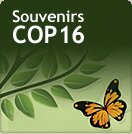Executive Summary Special Climate Change Program 2009-2012 Mexico
Special Climate Change Program (PECC*) and Steps Taken by Mexico to Reduce GHGs
The steps taken by Mexico to reduce its greenhouse gas (GHG) emissions will result in a reduction of 51 million tons of CO₂ in 2012 alone. This is the equivalent of removing all vehicles in Mexico City from circulation for four and a half years, or the equivalent of all the carbon dioxide captured and stored in a 1,700 km2 forest area (equivalent to the size of Mexico City).
Forest Resources
Today, Mexico’s forest resources provide the country with a great opportunity for mitigating climate change. Mexico is the first developing country to have successfully negotiated a US$500 million loan with the World Bank to finance technological assistance and increase scientific knowledge in relation with current sources of emissions and carbon sinks.
The Mexican government’s forest policy has garnered international recognition: Mexico will receive US$15 million from the Norwegian government to reduce emissions through soil conservation and reforestation.
An example of the steps taken by Mexico is the promotion of alternative sources of income for forest owners. They are to receive payment for engaging in environmental services for forest ecosystems, which for many Mexicans is a good incentive for halting extractive activities on their land.
At present, 2.3 million hectares of well-preserved forestland have been incorporated into the program of payment for environmental services, thus preventing the release of between 1,200 and 2,400 million tons of CO₂ or its equivalent into the atmosphere. In addition, reforestation programs will add another three million hectares by 2012.
Energy Conversion
The Federal Government is carrying out a process of energy conversion. In 2012, 26% of the electricity produced will come from renewable sources. The creation of a national fund totaling one billion pesos will contribute to this transition over the next three years.
Forty-two methane projects have been identified. Methane has a global warming potential twenty-one times larger than that of CO₂. With these projects, Mexico seeks to reduce GHG emissions by 12 million tons of CO₂ or its equivalent each year. Another thirteen projects will use the biogas generated by landfills, agricultural residues and coal mines in order to reduce GHG emissions by nearly two million tons of CO₂ or its equivalent per year.
In addition, there are two oil and gas projects within the Clean Development Mechanism of the Kyoto Protocol aimed at reducing GHG emissions by approximately 7.5 million tons of CO₂ or its equivalent.
The Mexican government is taking other steps as well to improve the environment, such as replacing old appliances with new ones that are more environmentally friendly. To date, about 537,000 refrigerators and air conditioners have been replaced with financing from the federal government for low-income families.
The goal of the Special Climate Change Program for 2012 is to replace nearly 2 million refrigerators and air conditioners, and more than 47 million incandescent light bulbs with compact fluorescent lamps or other more efficient lighting. With these measures, Mexico will cease to emit around 4.73 MtCO₂e (Metric Tons of Carbon Dioxide Equivalent), saving about 7,871 GWh of electricity between 2009 and 2012.
Adaptation to Climate Change
Regarding adaptation to climate change, Mexico has been promoting the core strategy of the Global Framework for Climate Services, which consists of creating specific climate services for each economic and social sector, so that each will have the necessary technical tools to adapt to the consequences of climate change with the least negative impact and in the most advantageous way possible.
Mexico believes that it is very important to think globally and act locally. For this reason, the current administration is helping states develop their own programs on climate change.
The response of the state governments has been very positive. Veracruz, Mexico City and Nuevo Leon already have such programs. Other states are putting together projects to be presented to the public in the near future, while others are implementing working methods to develop programs in the short term.
Executive Summary Special Climate Change Program 2009-2012 Mexico [PDF]
- Mexico’s general position
- National Communications
- Special Climate Change Program
- Executive Summary Special Climate Change Program 2009-2012 Mexico



Page 'Breadcrumb' Navigation:
Site 'Main' Navigation:


















Social Media Links:
Follow us: